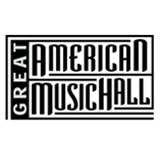
Earl Sweatshirt
Great American Music Hall
∙
San Francisco
Wednesday, February 26 at 8 pm PST
Rap / Hip-Hop
Serves Food
Nightclub
Concert Venue
Wednesday, February 26 at 8 pm PST
Rap / Hip-Hop
Serves Food
Nightclub
Concert Venue
Entry Options
Details
Artists
Description
On sale Friday, 1/24 at 10am !
$55 GA
Doors 7 pm | Show 8 pm
2 Distinct Sets! Different each night!
Earl Sweatshirt
Instagram | Facebook | YouTube | Spotify
Navy Blue
Website | Instagram | X/Twitter | Spotify
Sometimes an artist’s stage name and birth name are used interchangeably; sometimes the latter is clearly one costume of many, a small part of a larger identity. For Sage Elsesser, Navy Blue might have started out as a narrow outlet, a way for the then-art student, who had already enjoyed a measure of fame as a professional skateboarder, to work through his ideas about spare, confessional hip-hop. But as that outlet has come to yield some of the most accomplished rap music of its era—rap music that has been, to this point, deeply introspective, even mournful—it has come to seem like the totality of his person. With Ways of Knowing, Elsesser’s brilliant new Def Jam album as Navy Blue, the artist aims to round that persona into something fuller, richer, truer to his three-dimensional life. “I can transmute my grief into something more,” he says. “I don’t need to be in a state of excavation all the time.”
Whether excavating or exalting, Elsesser began compiling the toolkit to do so from an extremely young age. He was raised in Los Angeles in a house full of music. His mother, a Los Angeles native, was a singer and dancer, and his father was a Chilean multi-instrumentalist; he learned, when he was very young, to play drums—congas and batá—and was taught to chop Nina Simone samples, and by age eight had been gifted a AKAI XR20, on which he fell in love with making beats. This formalist background was complemented by the types of music education that snake their way through peer groups, one kid whispering to another about a half-remembered YouTube link or a low-quality .mp3 rip. For Elsesser, this came in the form of an elementary school classmate who put him onto the music of MF DOOM. That friend was Thebe Kgositsile, who would go on to become Earl Sweatshirt.
It was Earl who helped vault Elsesser’s music into the national conversation. Though a string of self-produced and self-released Navy Blue EPs had carved something of a niche online, a feature on “The Mint,” from 2018’s acclaimed Some Rap Songs, brought Elsesser to a much wider audience. Since then he has been lauded for his ability to make texturally daring music that is at once starkly revealing and shrouded in mystery, its moments of nakedness fractured into disparate parts that can be studied and reassembled by the listener.
Beginning with his proper debut album, Àdá Irin, and continuing through Song of Sage: Post Panic! (both releases 2020), Navy’s Reprise (2021), and a trio of 2022 physical-only drops (Gift of Gabriel: Rain’s Reign!, Crypt of Carlos: Onward!, and Arc of Atreyu: Neverending!), Elsesser has deepened those grooves of self-analysis, teasing out in real time the way acute depression, generational trauma, and a host of other issues have weighed on his spirit.
That perspective is crucial. It’s also only half of who Elsesser is. “I don’t really want to be remembered as this stoic guy who’s perpetually reflecting on my trauma and Black plight, you know?” he says. “I want to make something that makes people smile out of joy, rather than smile in grief.”
Ways of Knowing is produced in its entirety by Elsesser’s longtime friend and collaborator, Budgie, who he calls “the gospel encyclopedia.” And while the arrangements remain sparer than most music that comes out of the church, its warmth and sense of celebration bleed through. See “To Fall in Love,” which shimmers with the energy of new infatuation, or “Chosen,” which has all the verve of a verse delivered to dazzle friends, without concern for the outside world.
Budgie “challenges [Elsesser ] to simplify” his writing process, and even when Knowing grows more serious—as on “Freehold”—the messages are reduced to their essential elements, to their bones. “What’s the summer done?” he asks at one point. “And what’s the sum of all this damage done? / Who give a fuck? / I do.” Those quick reversals of tone and pose, from vulnerable to steely and back again, are at the core of every Navy Blue record: the constant evolution of a human being, the insistence on feeling every emotion but the refusal to be overcome by any one.
“I love the ever-changing experience,”Elsesser says, drilling down on this very topic. He says his old records often reveal themselves to him in new ways, giving him a new perspective on what he was going through during that writing process, or even speaking to the present moment.
With Ways of Knowing, he imagines relistening a decade in the future. The title is a sly comment on Elsesser’s willingness to admit what he doesn’t know, his hunger to fill in those gaps in knowledge. “I try my best to get out of my own way,” he says, “Because I don’t want to rob anybody of an experience due to my own insecurities.” With Ways of Knowing, he wields those insecurities like a scythe that cuts through the thicket of life around him.
El Cousteau
Instagram | X/Twitter | YouTube | Spotify


